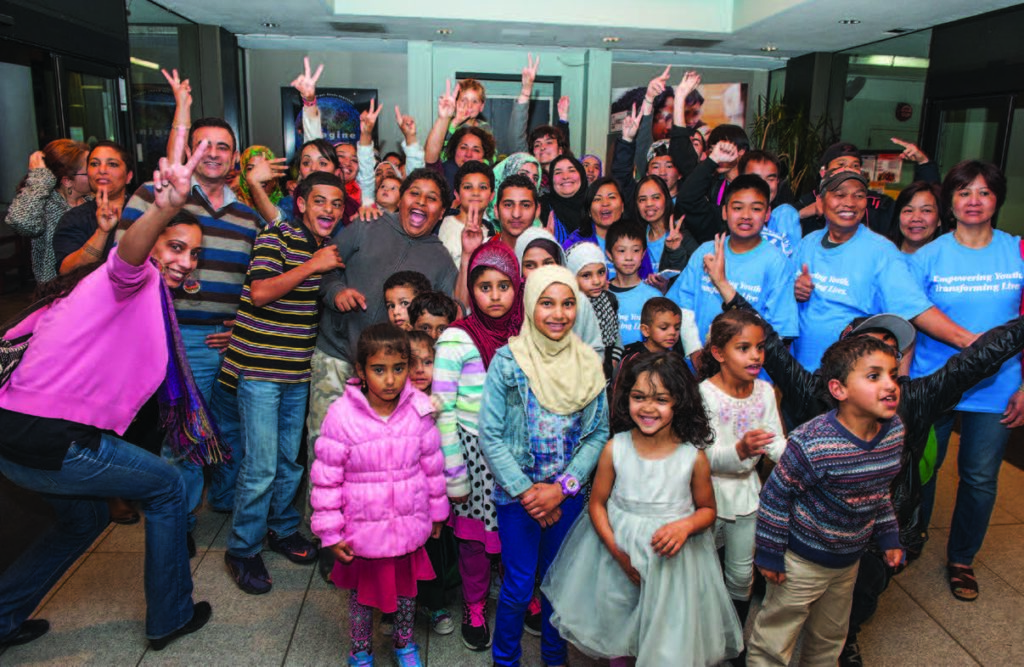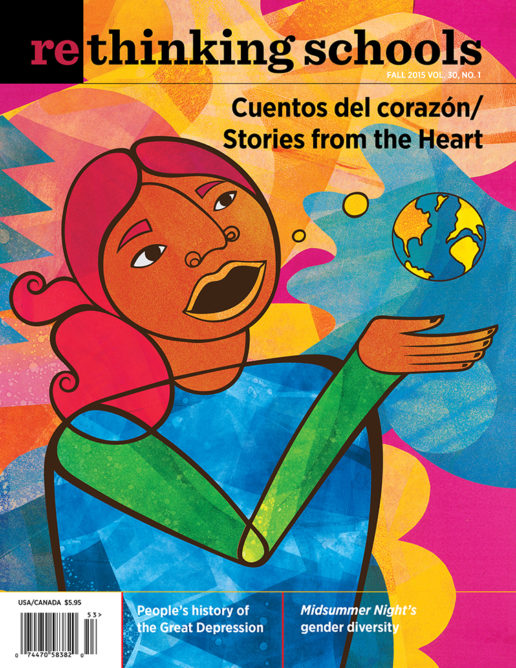Anti-Privatization Movement Goes International // Arabic Language Pathway Attacked in San Francisco
Anti-Privatization Movement Goes International
Teacher union leaders from around the world pledged to build an international movement against school privatization and commercialization at the 7th World Congress of Education International (EI) in Ottawa, Canada, at the end of July.
The EI congress, which convenes every four years, brought together more than 1,500 teacher union leaders from 170 countries, representing 400 organizations and 30 million teachers and other education workers. Simultaneous interpretation in eight languages enabled an emotional and wide-ranging debate of issues.
EI President Susan Hopgood set the tone, noting that austerity was used as an excuse to defund public education and that “teachers and trade unions are blamed directly for the irresponsible actions of banks and financial institutions.”
EI General Secretary Fred Van Leeuwen added that, in the previous four years, “cutbacks, privatization, de-professionalization, and anti-union measures have been the order of the day in too many countries.”
Child labor, gender equity, the climate crisis, refugees, immigration, and war were all discussed—but the unifying theme was the need to build greater unity against the privatization of education. There were three days of preconference workshops focused on gender, LGBTQ, and indigenous issues, and five days of deliberations. Leader after leader described the attacks on public education and teacher unions as a worldwide phenomenon coordinated by the World Bank, national governments, and edu-business corporations like Pearson.
Delegates from Honduras, Fiji, Colombia, Botswana, and South Korea described the attacks on public sector unions and the right to collectively bargain. Teachers from Kenya, Uganda, and India described World Bank-supported for-profit schools that charge tuition in areas of extreme poverty. These schools hire poorly trained “teachers” who read scripted curriculum to their students.
Throughout the congress, attention was focused on Pearson PLC, which has branded itself as the “world’s leading education company.” It currently operates in more than 90 countries and holds a major share of the world’s textbook and testing market.
Angelo Gavrielatos, former president of the Australian Education Union and now project director for EI, explained that EI’s current plan is to focus efforts against Pearson PLC in the Global North and in select countries in the Global South where Pearson is trying to secure control of not only testing and textbooks, but also entire schools. According to Gavrielatos, this will not be a short-term campaign. “We are building a movement—an international movement. To simply demonstrate that privatization undermines public education and is detrimental to the interests of society is not enough. We must take action aimed at exposing, halting, and reversing it.”
It’s a bold objective. But as one NEA delegate said, “I just keep on hearing everywhere [at the congress that] privatization is a global problem and we need a global solution.”
EI is poised to coordinate that movement. But its success will depend on national unions prioritizing the effort and millions of teachers, education workers, students, and parents creating momentum in their local communities.

Arabic Language Pathway Attacked in San Francisco
The San Francisco Unified School District has “world language pathways” in Spanish, Cantonese, Korean, Japanese, Tagalog, French, Hebrew, Italian, Latin, Mandarin, and Russian. Over the years, Arabic- and Vietnamese-speaking families in the Tenderloin neighborhood, where many of them live, have asked for pathways in their languages.
In response, the Arab Resource and Organizing Committee (AROC) began a collaboration with the Vietnamese Youth Development Center (VYDC), teachers, parents, and members of the SF Board of Education to explore the possibilities for Arabic and Vietnamese language programs. After researching different approaches, they decided on a K-12 model that includes both language and culture and starts with an hour a day in elementary school. In addition, Arabic and Vietnamese studies would become components of the district’s ethnic studies courses.
The group developed the proposal into a resolution, which was passed unanimously by the school board on May 26. The community members who had filled the meeting room were overjoyed. “This resolution,” said AROC Executive Director Lara Kiswani, “expresses the board’s commitment to empowering the Arab and Vietnamese communities, valuing our languages, and ensuring that community voices are central to the design and implementation of the program.”
By the next morning, the Jewish Community Relations Council (JCRC) had launched an attack, demanding a revote on the resolution and pushing to exclude AROC as a community partner. They accused AROC of being an anti-semitic “hate group.” A broad range of Jewish individuals and organizations, including Jewish Voice for Peace and the International Jewish Anti-Zionist Network (IJAN), immediately disagreed. According to Sara Kershner, a founder and organizer for IJAN, “Criticizing Israel is not anti-semitic, it’s anti-racist. Many Jewish people object to Israel’s violence against the Palestinian people. AROC is anti-Zionist—against the ideology and movement that initiated and continues to expand the colonization of Palestine.”
AROC and VYDC gathered dozens of letters of support and the school board decided not to put a revote on their June agenda. JCRC upped the ante by exerting pressure on board members of organizations that sent letters to the school board.
JCRC has a long history—in the Bay Area and nationally—of attacking community-based organizations that are critical of Israel. They often rely on economic coercion—reaching out to funders and accusing the targeted organization of anti-semitism. In 2010, just two weeks before Oakland’s Museum of Children’s Art was scheduled to open an exhibit of children’s art from Gaza, JCRC was successful in intimidating the museum’s board, which canceled the exhibit. Other Bay Area organizations targeted by JCRC have included SF Women Against Rape, HOMEY, EastSide Arts Alliance, and the Middle East Children’s Alliance.
AROC has been working on immigrant rights issues in San Francisco for 30 years, and on language access for 15. Among other activities, it runs the only Arabic-language legal services in northern California and provides translation, mentorship, academic support, and after-school programming to Arab children in the area. AROC also participates in coalitions combating police repression and militarization, and defending Palestinian and Arab human rights.
The attack on AROC fits into a broader pattern of well-funded efforts by JCRC, other Zionist organizations, and the Israeli government to silence the growing opposition to Israeli violence against Palestinians. Progressive community, religious, and educational organizations in the Bay Area have joined together to defend AROC and the Arabic and Vietnamese language pathways. As Teachers 4 Social Justice urged the SF Board of Education: “Support the SF free speech movement by saying no to JCRC bullying. We ask that the board say no to racism and yes to working with community-based organizations in a way that is principled, has integrity, and respects their perspectives, while remaining focused on the work of serving our young people and their families.”

